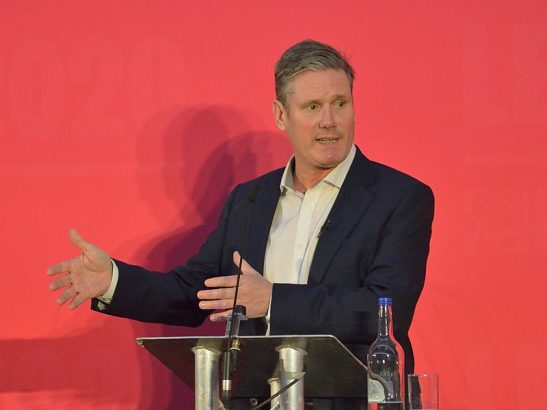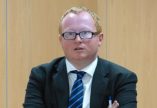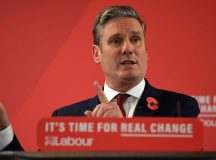In 2020, following Jeremy Corbyn’s leadership, the UK Labour Party was found guilty by the Equalities and Human Rights Commission of three breaches of the Equality Act for its treatment of Jewish members. At its 2022 conference current leader Keir Starmer was able to boast that the party has ‘ripped antisemitism out by its roots’ (and to celebrate a barely believable poll lead of 33 per cent over the Conservatives). Luke Akehurst, a member of the party’s National Executive Committee takes stock, taking justified pride in the changes made while urging eternal vigilance against those remnants of contemporary left antisemitism that are now descending into conspiracism.
Labour has come a long way in its internal politics and political standing with the public in the year since I last assessed these subjects for Fathom. At the time of the 2021 Annual Conference Keir Starmer was eight per cent behind the Tories, and whilst he won the conference votes on key rule changes (including the ones relevant to antisemitism) he did so with the delegates representing Constituency Labour Parties (CLPs) split almost exactly 50-50 between his own supporters and Corbynites. This year he ended the 2022 Annual Conference up to 33 per cent ahead of the Tories, and with the CLP delegates breaking 72 per cent to 28 per cent in favour of the leadership.[1]
Starmer referred boldly to tackling antisemitism in this year’s conference speech, proclaiming: ‘We had to change our party and prepare for power all in one go. Not change for change’s sake. Change with a purpose. To make our Labour Party fit to serve our country. That’s why we had to rip antisemitism out by its roots.’
Part 1: External Constraints
It’s important to remember that a lot of what Labour is doing to deal with antisemitism is not at its own discretion. That’s not to say that the political will to do these things isn’t there from Starmer and the people who support him, who are personally disgusted by antisemitism, are committed to tackling it, and realise it is a crucial part of the post-Corbyn detoxification of the party. But key aspects of how it is being done have been imposed by external intervention.
The Law
As well as a statutory regulator imposing a framework for tackling antisemitism, Labour also has to operate within the law, and this actually limits the party’s ability to implement the ‘zero tolerance’ regime that has often been demanded. Disciplinary action that the party takes has, in law, to be proportionate to the offences committed. Therefore ‘zero tolerance’ of antisemitism as a lay person might perceive it, i.e. you get expelled from the party automatically for saying or writing any antisemitic remark, would be illegal as the courts would overturn this as disproportionate punishment. The party therefore has to interpret ‘zero tolerance’ as meaning all cases get investigated properly. The actual sanctions imposed range from expulsion and fixed term punitive suspensions in the most egregious cases where discourse is particularly extreme, or there are multiple repeat offences, down through formal warnings to reminders of conduct. Where a member is found ‘guilty’ but not expelled, there is compulsory training in how to recognise and avoid antisemitism. The law also requires both mitigating circumstances (e.g. contrition) and aggravating circumstances (e.g. the offender holding public office, refusing to show contrition, direct harm to another member or the public) to be taken into account.
The Equalities and Human Rights Commission (EHRC)
To recap, despairing of the Corbyn leadership, the Jewish Labour Movement (JLM) and Campaign Against Antisemitism (CAA) took their concerns to the Equalities and Human Rights Commission (EHRC) in 2018 and in 2020 the EHRC found Labour culpable of ‘three breaches of the Equality Act (2010) relating to political interference in antisemitism complaints, failure to provide adequate training to those handling antisemitism complaints, and harassment.
In terms of the actions mandated by the EHRC, these have now almost all been completed, and the EHRC is satisfied with them and has demonstrated this by moving to a less frequent reporting regime. It is expected to soon sign the Labour Party off as having fulfilled its obligations and no longer being monitored. The Action Plan included a series of rule changes passed at the 2021 Annual Conference which overhauled the party’s disciplinary processes and brought in an independent system for reviewing cases heard by NEC panels (panels of three NEC members determine cases where all the evidence is in writing, such as antisemitic discourse on social media), and new independent panels to hear cases relating to antisemitism or any other protected characteristics and requiring oral evidence. It also involved the party rolling out online training on antisemitism, provided by Jewish Labour Movement, a party affiliate, which was delivered first to the NEC and Parliamentary Labour Party (PLP), then to local office holders and finally offered to all party members; tackling the backlog of complaints; and setting up an Advisory Board composed of members from the Jewish community and a Reference Group to ensure transparency and increase trust and confidence in party procedures.
The party has now dealt with the huge backlog of antisemitism cases inherited from the Corbyn era, as well as processing the day-to-day incoming cases. The most recent statistics made public on the party website show that between the change of Leader and General Secretary in May 2020 and the most recent stats being issued in July 2022, NEC panels heard 1,026 cases, of which 65.89 per cent related to antisemitism. 17.84 per cent of the 1,026 cases have resulted in expulsions and only 13.35 per cent led to no further action (i.e. the case was not proven). The Independent Review Board created at the instigation of the EHRC has been operating since April 2022 and seems satisfied that the NEC panels are doing their job correctly – they only referred back one of the first 55 case decisions they reviewed. During the second half of 2021 and first quarter of 2022, the project to clear the inherited backlog cleared 10,000 undealt with disciplinary complaints from the pre-2020 period.
Part 2: Internal Changes
Proscriptions
Labour hasn’t just done the basics of what was required by the EHRC though, it has taken additional steps which weren’t in the EHRC Action Plan. Most notably, the party has proscribed a series of organisations which the NEC has deemed to have values or structures incompatible with party membership. Not all of the seven proscriptions have related to antisemitism – two were of Trotskyist organisations proscribed for being rival political parties – but in five of the cases the organisations either claimed that the problem of antisemitism was exaggerated or went further and made an in-itself-antisemitic accusation that it was a smear campaign organised by Israel. The organisations proscribed on these grounds were Labour Against the Witchhunt, Labour in Exile Network, Socialist Labour Network (a merger of the first two organisations), Labour Left Alliance, and Resist, an organisation set up by former Labour MP Chris Williamson. Since the party set up NEC Exclusion Panels in October 2021 to look at cases where there is evidence of support for proscribed organisations over 250 members have been expelled by them.
Membership
The raw number of expulsions both from antisemitism cases per se and for membership of organisations proscribed over antisemitism adds up to about 400. That figure conceals a far bigger change in the party membership which has seen very large numbers of people who would harbour extreme anti-Zionist or in some cases antisemitic views self-exclude themselves from the Labour Party by resigning or allowing their membership to lapse. Labour’s membership base has seen a huge shift since the 2019 General Election. At that point it had about 430,000 members. About 120,000 new members joined or re-joined to vote in the 2020 leadership election. The result suggests most of these wanted the party to change direction from the Corbyn era. About 25,000 new members have also joined in 2022. Because the party’s membership is now 401,000 that implies at least 174,000 members from the Corbyn era have quit – over 40 per cent of the pre-2020 membership. These are likely to be disproportionately those members with the most extreme views as they are least likely to be reconcilable to the party’s change of direction. This in turn has changed the political control of and atmosphere in most CLPs, making them a more welcoming place for Jewish members, though it is important to note there are still individual CLPs where the politics and behaviour are a hangover from the Corbyn era.
National Executive Committee
The change in the politics of Labour’s membership is reflected in the elections to Labour’s NEC that took place this summer. The nine CLP representatives are elected by one member one vote using Single Transferable Vote, a proportional representation system, so they reflect the pluralism of opinion among party members. The moderate grouping Labour to Win took four seats, winning a plurality of the vote for the first time in two decades. These included the current author. I topped the poll by some distance for the second time and make no secret of my stance on tackling antisemitism in my manifesto. One seat was won by the ‘Soft Left’ Open Labour grouping, which has a good record on antisemitism. Three were won by the ‘official’ Corbynite Momentum group. The sting in the tail was the election of Naomi Wimborne-Indrissi in the ninth seat, with backing from smaller Hard Left groups but not Momentum. Wimborne-Indrissi is a founding member of Jewish Voice for Labour (JVL) a group of anti-Zionist Jewish activists which has argued against the party adopting the International Holocaust Remembrance Alliance (IHRA) definition of antisemitism. Her election was therefore greeted with consternation by the mainstream of the Jewish community. It shows that a residual 10 per cent of Labour Party members will vote for a candidate who completely disputes the party leadership, EHRC and Jewish communal narrative about antisemitism. However, she has yet to take up her seat on the NEC as she has now been suspended from the party pending an investigation into her speaking at a meeting of Chris Williamson’s Resist group. The overall balance of the NEC now sees the Corbynite Hard Left holding just 11 of 39 seats.
Part 3: Corbynites Going Backwards
Unfortunately, as the wider party has moved into a far better position on antisemitism, the progress that had been made within the Corbynite Hard Left on the issue of left antisemitism seems to have gone into reverse.
By the end of the Corbyn era the then leading figure in the Momentum grouping, Jon Lansman, had taken his organisation on a journey towards acceptance that antisemitism in the party was a very real problem that needed to be tackled, and organised political education within Momentum on how to recognise contemporary antisemitism. This reflected his own direct experience of antisemitic abuse as a prominent Jewish member of the party. Lansman has now been marginalised within Momentum and a new leadership there has reverted to the initial Corbynite response to the antisemitism crisis, instructing conference delegates in 2021 to vote against the EHRC-mandated rule changes, and – whilst their individual NEC members play a constructive role in quasi-judicial disciplinary panels – voting against every measure the full NEC takes to tackle antisemitism.
In fact, the narrative on some parts of the Hard Left is degenerating further sharply. No longer claiming only that claims of antisemitism are ‘exaggerated’, some are buying into the narrative of the Al-Jazeera documentaries ‘The Lobby’ and ‘The Labour Files’ that antisemitism has been deliberately weaponised by a conspiracy of the right of the party, Israel and Zionists to deny Corbyn the chance to become Prime Minister, and to subsequently purge the left. More: that moderate party officials deliberately dragged their feet on tackling antisemitism in the 2015-2018 period, that there is a hierarchy of racism in the Labour Party whereby there is an excessive focus on antisemitism while Islamophobia and anti-black racism are ignored or even perpetrated by the Labour right. JVL’s specific narrative is that they, anti-Zionist Jews, are being disproportionately targeted by Labour’s disciplinary process, and that they are therefore the victims of an antisemitism that targets Jews whose Jewish identity involves not supporting Israel.
For two years following the May 2020 leaked Labour Party submission to the EHRC the Corbynites put great stock behind the independent Forde Report, thinking it might uphold some of their wilder conspiracy theories about the weaponisation of antisemitism. Forde finally delivered his report in July 2022 and whilst it does present Labour with the tough message that it needs to do more to tackle Islamophobia and anti-black racism and remove a culture of factionalism, there is nothing in it that contradicts the findings of the EHRC relating to antisemitism. Forde stated: ‘There is nothing in the Leaked Report (or elsewhere in the evidence we have seen) to support the conclusion that the problem of antisemitism in the Party was overstated.’
The lock that Starmer now appears to have on the party machinery meant that those elements of the Corbynite Hard Left who most dispute the leadership’s narrative about antisemitism are now contemplating whether they have a future inside the party. For Jeremy Corbyn himself, he faces a choice between apologising for his reaction to the publication of the EHRC Report when he said that antisemitism in Labour was ‘dramatically overstated for political reasons’ or never being readmitted to the PLP and having to fight the next General Election as an Independent candidate. JVL spent its fringe meeting at Annual Conference hearing from a former Labour councillor who has joined the Green Party on why they should join her, and from their Chair speculating about whether the ‘Labour’ in their title should be reinterpreted to refer to the wider labour movement rather than the party.
Conclusion: Fantastic Progress, Continual Vigilance
Unfortunately, this illustrates the problem that those of us trying to fight antisemitism continue to face. It’s fantastic that the Labour Party has made such strides in just three years, and that people who promote antisemitic narratives or deny antisemitism is a problem are now marginalised in the party, or have been expelled or walked away. That’s hugely important now that Labour is looking likely to form the next Government. But we shouldn’t underestimate the extent to which the Corbyn era saw the spread of antisemitic discourse and tropes to a very large audience via social media. There are many times more conspiracy theorists propagating ‘hot takes’ on Zionist control of politics, or the Rothschilds, than there were before 2015. The continued flow of disciplinary cases within Labour shows there are still voices inside the party promoting these concepts, even if they are nowhere near the levers of power in the party. And the ‘left’ in Britain is wider than the Labour Party. While many of those who bought into antisemitic narratives don’t want to be part of Starmer’s Labour, they are still politically active, whether that is in NGOs and community or single-issue politics, the trade union movement, or on social media. We can’t just pat ourselves on the back and say ‘job done’ – we will need to be continually vigilant as the tragic legacy of the Corbyn years is that a country that used to have among the best scores in the world for the low prevalence of antisemitic attitudes now has a serious antisemitism problem.
[1] I should declare two interests. First, since 2020 I’ve been an elected member of Labour’s National Executive Committee (NEC) so I’m part of the governance structures of the party and directly involved in its efforts to tackle antisemitism. Second, in my day job I am Director of the campaign group We Believe in Israel, which as its name suggests, is a pro-Israel organisation.































